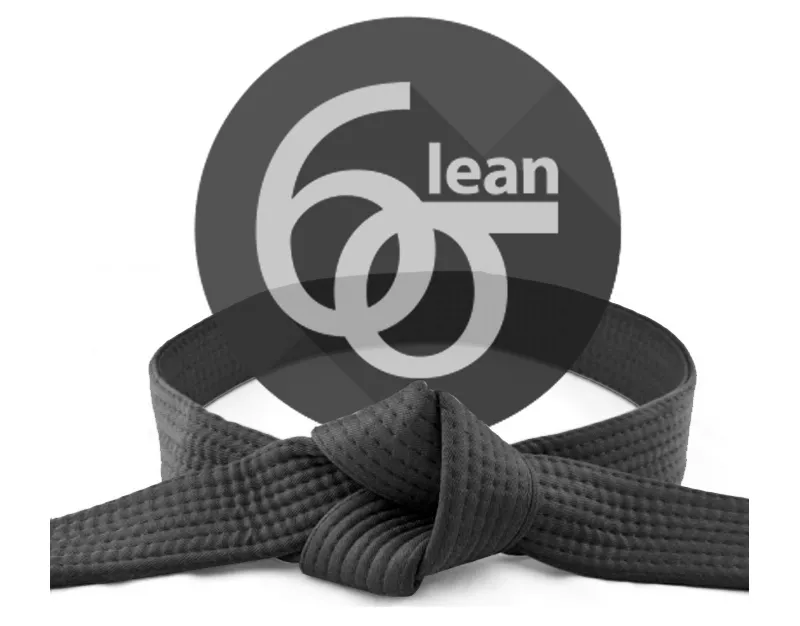
Trusted Training Partners


















Home / Specialist / Specialist Courses / Lean Six Sigma Black Belt Training Course
Quick Look Course Summary:Lean Six Sigma Black Belt Training Course
-

Next Public Course Date:
-

Length: 10 day(s)
-

Price (at your venue): 1 Person R 0.00 EX VAT 3 Person R 0.00 EX VAT 10 Person R 0.00 EX VAT
-

Certification Type: Non-Accredited
-

Locations & Venues: Off-site or in-house. We train in all major city centres throughout South Africa.

Get Free & personalised
Training Advice
WHAT IS LEAN SIX SIGMA?
Lean Six Sigma is not an add-on to normal business activities. When implemented correctly, it is an integral part of the management and production process – driven by data and philosophy.
Six Sigma is a data-driven approach for eliminating defects and waste in any business process. You can compare Six Sigma with turning on your kitchen tap and experiencing the flow of clean, clear water. Dependable systems are in place to treat, purify and pressurize the water through the tap. “That is what Six Sigma does to business: it treats the processes in business so that they deliver their intended result.” (As cited in Six Sigma For Dummies By Craig Gygi, Neil DeCarlo, Bruce Williams). Lean means getting rid of the baggage that slows any process down, and not just production.
Together Lean philosophy and Six Sigma can assist any business, with production processes, redundant floor space, complaints resolution, eliminating waste and improving efficiencies within all aspects of an organization. Important to note; is that Lean Six Sigma is not about getting rid of people, but rather empowering employees to be more efficient in their own space.
This course will comprehensively teach participants the entire Lean Six Sigma methodology and essential business principles, including practice activities to do during and between workshop sessions.
Participants will be taught Basic Statistics (YB & GB) and Advanced Statistics (GB & BB); The Harada Method (GB & BB); Theory of Constraints (only Black Belts); the philosophy & the foundations of the 5 Principles of Lean and Six Sigma DMAIC. Armed with various tools within each phase, participants will be able to simplify complexed business problems through analysing data for variation and ultimately coming up with practical solutions. The aim of which is to reduce waste, minimise defects, improve efficiencies and bottom-line results.
Description
Lean Six Sigma Training
All Six Sigma Training is done according to the syllabus for the various courses specified.
- Lean Six Sigma Yellow Belt (LSSYB)
- Lean Six Sigma Green Belt (LSSGB)
- Lean Six Sigma Black Belt (LSSBB)
The Modules are similar for the different levels except for the depth in each case.
The structure of the training contact time is divided as follows:
- In-class, instructor led training
- Self-Study (including mandatory assignments, exam and case study to complete and submit)
In-class, instructor led training:
At the end of each classroom contact session, the participant mut successfully complete a True/False and Essay type exam/test for each module.
Case Study:
The case study provides information as if it were a real-life business problem. The participant is expected to apply the (RECOGNIZE) DEFINE, MEASURE, ANALYSE, IMPROVE and CONTROL phases of Six Sigma using the information provided at each stage, to solve the problem “hidden” in the data; and to “deliver” the expected financial benefits. Through working through the case study, the participant demonstrates the underlying thinking process and application of the appropriate tools learnt during the training.

Lean Six Sigma Black Belt Training
Black Belts- apply 6 Sigma methodology to specific projects. They devote 100% of their time managing multiple Lean 6 Sigma Projects and focus on project execution.
Course Duration
- 10 days In-class, instructor led training
- Self-Study (including mandatory assignments, exam and case study to complete and submit)
The Lean Six Sigma Black Belt is a professional well versed in the Lean Six Sigma Methodology, who leads improvement projects, typically in a full-time role. A Lean Six Sigma Black Belt possesses a thorough understanding of all aspects within the phases of D-M-A-I-C. They understand how to perform and interpret Six Sigma tools and how to use standard principles of Lean.
Our Black Belt Lean Six Sigma Training consists of 10 in class instructor-led sessions, run over 14 weeks and these can be configured to suit business needs: i.e., 10 consecutive or 2 consecutive weeks, a 2 week break then another 2 consecutive weeks and 1 week break and then the 2 last weeks (so effectively completed within 13 weeks). Together we can determine the best time frame configuration. Classes run with a minimum or 2 and maximum of 10 delegates per instructor led contact session. In between the various training sessions, delegates will be tasked with self-study, exercises, case studies & assessments to complete, along with a few relevant videos to view.
Delegates will be tasked beforehand to identify a problem area or project and this will form the basis of their practical application of the theory in combination to completing a simulation/ case study.
After each phase of the training, the delegates will be given tasks which they will then apply practically (i.e, collate, collect, stratify data etc.), this is then built on over the duration of the course. Delegates will further complete assessments at the end of each module to determine the level of understanding.
Delegates will be assessed at the end of each module and given self-study/pre-reading, case studies and a simulated project to show understanding and application of acquired principles.
A succinct Case Study (eg, slides indicating practical application of the various tools) will be submitted to the coach/facilitator for marking and feedback.
Course Overview
Module 1: Introduction to Quality and Lean Six Sigma
- Historical Overview of Quality
- Understanding Quality and its Application to Products and Services
- Contributions of Quality Gurus to the Field
- Adopting a Holistic, Enterprise-wide Perspective
- The Role of Leadership in Quality Initiatives
- Roles and Responsibilities within Lean Six Sigma
- Forming Effective and Productive Teams
- Facilitating Teamwork
- Managing Team Dynamics
- Time Management Techniques for Teams
- Tools for Team Decision-making
- Management and Planning Tools for Lean Six Sigma
- Evaluating Team Performance and Recognizing Achievements
- Overview of DMAIC (Define, Measure, Analyze, Improve, Control)
Module 2: Define Phase
- Identifying Key Stakeholders
- Understanding Stakeholder Impact
- Defining Critical-to-Quality Requirements
- Utilizing Benchmarking for Performance Comparison
- Measuring Business Performance with Various Metrics
- Financial Measures for Assessment
- Capturing Voice of the Customer (VOC)
- Kano’s Customer Satisfaction Levels
- Juran’s Customer Needs
- Conducting Market Research
- CTQ Flowdown to Specific Requirements
- Quality Function Deployment (QFD)
- Establishing Performance Metrics
- Developing the Project Charter and Gaining Approval
- Negotiating the Charter’s Scope and Objectives
- Creating Project Management Plans and Baselines
- Implementing Project Tracking Mechanisms
Module 3: Measure Phase
- Understanding Processes and their Characteristics
- Process Flow Metrics, Inputs, and Outputs
- Creating Process Maps and Flow Charts
- Utilizing SIPOC (Suppliers, Inputs, Process, Outputs, Customers)
- Data Types and Measurement Scales
- Strategies for Data Collection
- Implementing Sampling Techniques
- Fishbone Diagram for Root Cause Analysis
- Prioritizing Solutions with Relational Matrices
- Basic and Analytical Statistics
- Gauge R & R (Repeatability and Reproducibility)
- Assessing Process Capability
Module 4: Analyze Phase
- Correlation and Regression Analysis
- Hypothesis Testing
- Failure Mode and Effects Analysis (FMEA)
- Conducting Gap Analysis
- Root Cause Analysis using The Five Whys
- Pareto Diagram for Focus Areas
- Utilizing Tree Diagrams
- Identifying and Eliminating Non-Value-Added Activities
- Understanding the Cost of Poor Quality (COPQ)
Module 5: Improve Phase
- Design of Experiments (DOE)
- Implementing Poka-yoke (Error Proofing)
- 5S Methodology for Workplace Organization
- Kanban for Efficient Production
- Standard Operations and Work Instructions
- Cycle Time Reduction Techniques
- Continuous Flow Manufacturing
- SMED (Single-Minute Exchange of Die)
- Implementing Kaizen and Kaizen Blitz Events
- Application of Theory of Constraints (TOC)
- Risk Analysis for Effective Decision-making
Module 6: Control Phase
- Implementing Statistical Process Control (SPC)
- Additional Control Tools
- Maintaining and Sustaining Controls
- Ensuring Continual Improvement and Integration of Changes
Module 7: Design for Six Sigma (DFSS)
- Introduction to DFSS and its Methodologies
Module 8: Expanding on Lean Concepts
- Creating Value Stream Maps
- Understanding Lean’s Emphasis on Speed
- Integrating Lean Principles in the Supply Chain
- Lean Six Sigma Logistics
Module 9: Case Studies
- Case Study 1 – Part 1
- Case Study 1 – Part 2
- Case Study 2 – Part 1
- Case Study 2 – Part 2
Note: The course outline provides a comprehensive overview of the topics covered in the Lean Six Sigma Black Belt training program. Each module delves into specific aspects to equip participants with the necessary knowledge and skills to drive process improvements and achieve excellence in their organizations.
Successful Completion
- Successful completion requires passing of all exams provided by BOTI for each Module, as well as the Case Study.
- Upon completion, all delegates will receive a Certificate of Attendance from BOTI.
- All Exams are under 6sigmastudy™ – please see below why BOTI has this certification route.

| 6sigmastudy™ Six Sigma Certifications | Other Six Sigma Certifications | |
| 1. Biggest accreditation body for Six Sigma certifications | 6sigmastudy™ is the biggest accreditation body for Six Sigma certifications. 6sigmastudy™ has the largest Authorized Training Partner (A.T.P.) network of 2,100+ partners in 90+ countries. | Other Six Sigma accreditation bodies are smaller and not as well-recognized as 6sigmastudy™. |
| 2. Students from 25,000+ companies in 150+ countries | VMEdu® / 6sigmastudy™ has trained/certified more than 750,000 students in delivering successful Six Sigma projects. More than 5,000 students are certified by 6sigmastudy™
each month which is more than any other certification body. Employees of 25,000+ companies from 150+ countries have enrolled with 6sigmastudy™/VMEdu®. |
Other Six Sigma accreditation bodies are not as popular or as widely accepted. |
| 3. Industry-wide acceptance | The knowledge gained by getting a 6sigmastudy™ certification is universal in its application and has been applied by organizations in diverse projects spanning an eclectic mix of industries. | Other Six Sigma certifications are not accepted in all industries. Most of the time the learning from these certifications applies only to specific industries. |
| 4. Established name in Six Sigma certifications | Training for 6sigmastudy™ certifications are provided by Authorized Training Partners (A.T.P.s) globally.
With more than 2,100+ A.T.P.s globally, 6sigmastudy™ has the widest network of accredited training companies offering its certifications. 6sigmastudy™ certifications are widely reputed and accepted by various Fortune 500 companies such as Apple, IBM, HP, Bank of America, AT&T, Dell, Verizon, Lockheed Martin, and PepsiCo. |
Other Six Sigma certification companies conduct their training through a much smaller network of trainers or training companies, and do not have the same level of credibility in the market that 6sigmastudy™ has. |
| 5. Active Discussions to share and learn | 6sigmastudy™ engages the Six Sigma/Lean and Quality Management community through active discussions on LinkedIn, Twitter, Facebook, multiple Discussion Forums and Blogs. The 6sigmastudy™ LinkedIn Group is the most active Group for Six Sigma on LinkedIn. | Usually, other certification providers do not have such high activity discussion forums to engage their community. |
| 6. Multiple free resources for Six Sigma Community | 6sigmastudy™ provides a wide range of free resources such as 5+ hours of high-quality videos, useful case studies, interactive mobile apps, blogs, and articles, thereby contributing to the increased awareness of Six Sigma in the Six Sigma communities. | No other Six Sigma Certification provides high quality content and free resources to students in multiple formats. The main focus of such certification providers is to get students to their paid classes, rather than help students succeed with best practices. |
Realize incredible savings by sending more delegates
Duration: 10 day(s)
Delegates: 1
Cost (incl):




